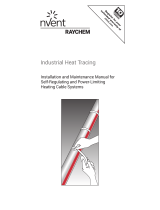Page is loading ...

DESCRIPTION
The nVent RAYCHEM RTD4AL is a three-wire platinum RTD
(resistance temperature detector) typically used with monitoring
and control systems that require accurate temperature control.
The RTD4AL kit can be used with a wide variety of nVent
RAYCHEM monitoring and control systems.
These instructions detail the installation of the RTD4AL kits in
conjunction with existing nVent RAYCHEM component kits.
TOOLS REQUIRED
• 3.5 mm flat-blade screwdriver
ADDITIONAL MATERIALS REQUIRED
• Pipe straps
• Conduit with 16–22 AWG shielded instrument cable or
equivalent armored cable
APPROVALS
The RTD4AL, RTD4AL-SS, and RTD4AL-EP are CSA Certified for
use in North America by the manufacturer for use in Division 2
hazardous locations as follows:
KIT CONTENTS
Qty Description
1 RTD Temperature Sensor
SPECIFICATIONS
RTD4AL
Sensor housing
Aluminum; Type 4X
RTD4AL-EP
Sensor housing
Epoxy Coated Aluminum; Type 4X
RTD4AL-SS
Sensor housing
316 Stainless Steel
Sensor sheath 316 Stainless Steel
Range –100°F to 900°F (–73°C to 482°C) max
Accuracy ±1°F (0.5°C) at 32°F (0°C)
Resistance 100 ohms at 0°C α =0.00385 ohms/ohm/°C
Connection 3/4 in. NPT conduit hub
Class I, Division 2, Groups A, B, C, D
Class II, Division 2, Groups F, G
This component is an electrical device. It must be installed correctly
to ensure proper operation and to prevent shock or fire. Read
these important warnings and carefully follow all the installation
instructions. Component approvals and performance are based on
the use of specified parts only. Do not use substitute parts or vinyl
electrical tape to make connections.
WARNING:
RTD4AL
RTD Temperature Sensor for Temperature Measurement
up to 900°F (482°C) Installation Instructions
3 in (76 mm)
2 in (51 mm)
4.25 in
(108 mm)
3/4-in NPT
(19 mm)
conduit
opening
3 in (76 mm)
2 in (51 mm)
4.25 in
(108 mm)
3/4-in NPT
(19 mm)
conduit
opening

nVent.com/RAYCHEM
©2020 nVent. All nVent marks and logos are owned or licensed by nVent Services GmbH or its aliates. All other trademarks are the property of their respective owners.
nVent reserves the right to change specications without notice.
RAYCHEM-IM-H56918-RTD4AL-EN-2011 PN 858160-000
WIRING INFORMATION
The length of RTD extension wires is determined by the wire
gaugeused.
To reduce the likelihood that electrical noise will affect temperature
measurement, keep RTD extension wires as short as possible.
Use shielded instrument cable such as nVent RAYCHEM
MONI-RTD-WIRE (22AWG, PVC insulation, –30°F to 140°F,
–20°C to 60°C) or Belden 83553 (22 AWG, FEP insulation,
–95°F to 395°F, –70°C to 200°C).
Maximum RTD extension wire length
AWG Feet (meters)
16 4500 (1400)
18 2800 (880)
20 1800 (550)
22 1100 (340)
RTD4AL WIRING
Connect the wires as shown.
1 Note: Ground RTD extension wire shield at one
end only, preferably at nVent RAYCHEM
electronics end.
2 Note: RTD housing must be properly grounded
using the screw provided.
Electrical schematic of RTD
Red (Source)
White
Red
Red
Red (Compensate)
Field Wiring
White (Common return)
RTD DIRECT CONNECTION
Pipe strap
Place strap under heating cable
Conduit
drain
INSTALLATION WITH HEATING CABLE ELECTRICAL WIRING GUIDELINES:
Electrical Wiring Notes:
Most electrical codes (such as NEC Article 725) permit Class 1
circuits to occupy the same cable, enclosure, or raceway without
regard to whether the individual circuits are alternating current
or direct current, providing all conductors are insulated for the
maximum voltage of any conductors in the cable, enclosure or
raceway.
Additional Materials Required
• JBS-100-A or other power connection kit
• Pipe straps
Conduit
drain
JBS-100-A
Sensor
Splice box
(provided by others)
North America
Tel +1.800.545.6258
Fax +1.800.527.5703
Europe, Middle East, Africa
Tel +32.16.213.511
Fax +32.16.213.604
Asia Pacific
Tel +86.21.2412.1688
Fax +86.21.5426.3167
Latin America
Tel +1.713.868.4800
Fax +1.713.868.2333
/

